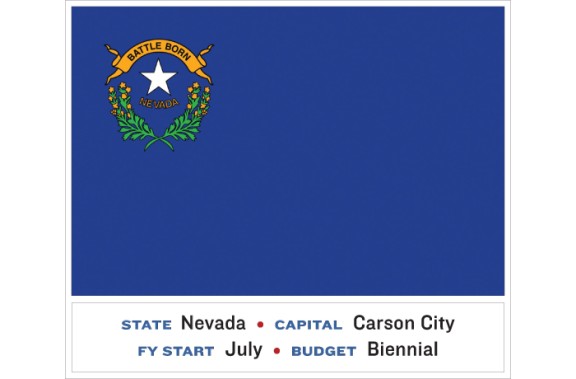Nevada
Nevada
State Budget Sources Guide and Budget Practice Report Card

State Budget Sources
State Budget Sources: An Annotated Guide to State Budgets, Financial Reports, and Fiscal Analyses is a resource published by the Volcker Alliance designed to help public officials, policy advocates, journalists, academics, and concerned citizens fully understand the critical fiscal decisions that governors and legislators must make. The guide includes the links below to budgets for this state as well as legislative analyses of budget bills and treasurers’ or comptrollers’ monthly state cash-flow statements; capital spending plans; reports on public-worker pension funding and returns; and reports by local and national fiscal research organizations, bond rating firms, and associations of state fiscal and finance officials.
Executive and Other Constitutional Finance Offices
Prior, current, and upcoming biennial budget documents; performance and fiscal information.
Statistics, charts, and tables on Nevada’s economy and general fund revenues, issued monthly.
Chief financial officer for the state, with accounting and financial reporting responsibilities.
Transparency site with budget information, state spending, tax expenditure, and economic development reports.
Non-Governmental Organizations
Some work on taxes and pensions, with an emphasis on individual liberty; part of the State Policy Network of state-focused, free market-oriented think tanks.
Salary and pension information; run by the Nevada Policy Research Institute.
Follows tax and finance issues and provides legislative updates to members; some material is available for a fee. Member of the Governmental Research Association and the National Taxpayers Conference.
Legislative Offices
Fiscal and budget information, with links to the interim finance, retirement, and benefits committees.
Document prepared by the Fiscal Analysis Division based on the governor’s biennial budget recommendations; includes a summary of the state’s financial condition.
Detail on the biennial budget and related finances.
Performance audits, special audits, and investigations.
Revenue, taxation, and state budget information.
State Budget Report Cards
The report cards found here contain grades of the state's budgetary practices during the fiscal years of 2015 through 2019. Each state received marks in five critical categories, based on their adherence to best practices in several key budgeting indicators. The five categories covered methods used to achieve budgetary balance as well as how budgets and other financial information are disclosed to the public.
States received grades of A to D-minus (there are no “failed states”) for their procedures in estimating revenues and expenditures; their use of one-time actions to balance budgets; how they oversee and use rainy day funds and other fiscal reserves; the adequacy of their funding of public worker retirement and other postemployment benefits; and the quality of transparency of budget and related financial information. The grades are based on research conducted by public finance and budgeting professors and students at eight US schools of public administration or policy. The universities’ research efforts were augmented by Volcker Alliance staff, data consultants at Municipal Market Analytics, and special project consultants Katherine Barrett and Richard Greene.
Select a State Below to View State Report Cards and Budget Sources
- National Organizations and Federal Agencies
- Alabama
- Alaska
- Arizona
- Arkansas
- California
- Colorado
- Connecticut
- Delaware
- Florida
- Georgia
- Hawaii
- Idaho
- Illinois
- Indiana
- Iowa
- Kansas
- Kentucky
- Louisiana
- Maine
- Maryland
- Massachusetts
- Michigan
- Minnesota
- Mississippi
- Missouri
- Montana
- Nebraska
- Nevada
- New Hampshire
- New Jersey
- New Mexico
- New York
- North Carolina
- North Dakota
- Ohio
- Oklahoma
- Oregon
- Pennsylvania
- Rhode Island
- South Carolina
- South Dakota
- Tennessee
- Texas
- Utah
- Vermont
- Virginia
- Washington
- West Virginia
- Wisconsin
- Wyoming